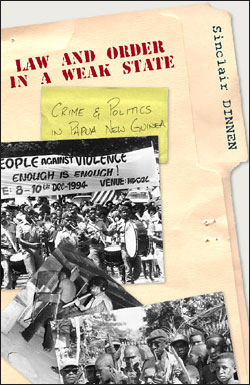Law and Order in a Weak State Crime and Politics in Papua New Guinea
Twenty-five years after independence, the government of Papua New Guinea
struggles to make a nation out of its many diverse communities. Securing a diverse population’s
allegiance to a national ideology is compounded in PNG by a host of interrelated social and
economic problems, not the least of which are a stagnant economy, a young, expanding,
increasingly frustrated population, and crime. The illegal, sectarian, and violence-promoting
activities of some politicians further strain the credibility, even viability, of PNG’s government.
The totality, complexity and richness of the country certainly can not be reduced to the
issue of public order. Nonetheless, lawlessness has become a measure for the performance
and future prospects of the government.
History is also at issue. The crisis over PNG’s postcolonial present has deep colonial roots
involving Australia’s administration and exploitation of the area. There are also the regional
ramifications of instability in a PNG that shares an island with a larger, more turbulent
Indonesia. Law-and-order problems matter most, however, to the citizens of PNG, for whom
threats to safety and property can be a daily issue.
Sinclair Dinnen invites readers to move beyond the apocalyptic descriptions and doomsday
forecasts that have characterised much of the popular, and even academic, writing on crime
in contemporary PNG. His work focuses on three case studies involving urban gangs, mining
security, and election-related violence. In each of these case studies, Dinnen sees the complex
interplay of Melanesian social practices with the uneven, disruptive forces of modernisation.
The dynamics of these engagements are examined through an enriched, analytical framework
that employs materialist, culturalist, and institutionalist perspectives.
Dinnen is interested in charting not only the problems and complexities of crime, but also
the possibilities for constructive, pragmatic solutions. His findings challenge the orthodoxy
advanced by much of the extant literature on law and order in PNG. He detects a more culturally
appropriate strategy for controlling civil disorder in PNG, a strategy reflecting established
Melanesian patterns of restorative justice that condemn the crime but pardon the criminal, and
that promote a humane solution to the problem of urban crime.
Law and Order in a Weak State: Crime and Politics in Papua New Guinea is a bold, insightful,
ambitious book that goes beyond the limited, more community-focused studies of earlier
scholarship. Dinnen has undertaken a comprehensive examination of law and order in PNG,
while remaining acutely sensitive to the diversity of peoples, practices, and beliefs found
within the country. The book’s attention to postcolonial governance and its employment of the
weak-state thesis will be of interest to readers in the larger Pacific and beyond.
|
|

AUTHOR:
Sinclair Dinnen
STATUS:
Back List
PRICE:
$39.95
ILLUSTRATIONS:
28 black-and-white photographs, 3 maps
FORMAT:
Portrait; softcover; xviii + 248 pages
DIMENSIONS:
234 x 153 mm
ISBN:
1863332219
|
|

